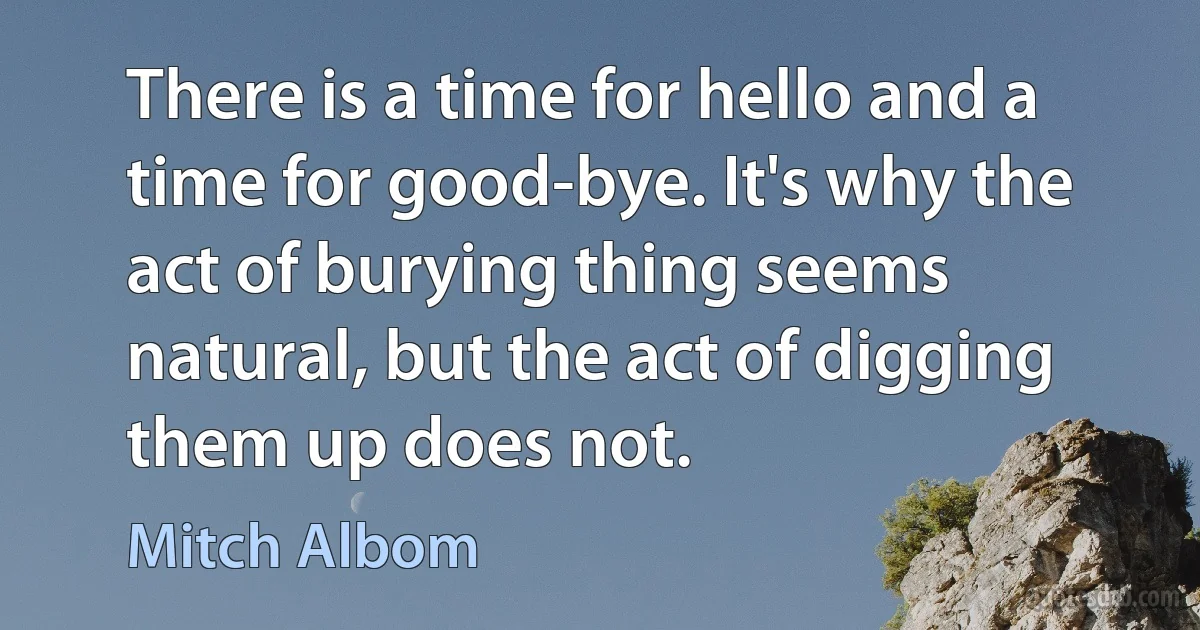Burying Quotes - page 2
People idealise their animals, and at the same time they patronisingly overlook a dog's natural life - biting fleas, burying bones, rolling in garbage, barking up an empty tree all night... But what do they do themselves? Bury stuff that will rot in secret and then dig it up and bury it again and rant and rave under empty trees!

Tove Jansson
The instructor must spare no pains in preventing the soldier from using force, especially with the left or guiding arm, as too much exertion generally causes the thrust to miss. A trifling body-stab with the bayonet (I may add with the sword) is sufficient to disable a man; and many a promising young soldier has lost his life by burying his weapon so deep in the enemy's breast that it could not be withdrawn quickly enough to be used against a second assailant. To prevent this happening, the point must be delivered smartly, with but little exertion of force, more like a dart than a thrust, and instantly afterwards the bayonet must be smartly withdrawn.

Richard Francis Burton
Surely the glory of finally getting rid of and burying a long and troublesome matter should be as great as that of making an important discovery. The trouble is that the coverer is like Samson who perished in the wreck of what he had destroyed; if he gets rid of a thing effectually he gets rid of himself too.

Samuel Butler (novelist)
This is very pretty,” said Elizalde...
"It's morbid,” snapped Sullivan. "Burying a bunch of dead bodies, and putting a fancy marker over each one so the survivors will know where to go and cry. What if the markers got rearranged? You'd be weeping over some stranger. Not some stranger, even, some cast-off dead body of a stranger, like a pile of fingernail clippings or old shoes, or the dust from inside an electric razor. What's the difference between coming out here to think about dead Uncle Irving, and thinking about him in your own living room? Okay, here you can sit on the grass and be only six feet above his inert old body. Would it be better if you could dig a hole, and sit only one foot above it?” He was shaking. "Everybody should be cremated, and the ashes should be tossed in the sea with no fanfare at all.”
"It's a sign of respect,” said Elizalde angrily. "And it's a real, tangible link. Think of the Shroud of Turin! Where would we be if they had cremated Jesus?

Tim Powers
If no attempt is made to control excessive heat loss through glass... a solar house may require as much as 20 percent more fuel than an orthodox house during December and January... Wendell Thomas recognized and solved this problem... by burying the house in the ground, except for the south and east window areas. ...at night... windows are covered with from inside by insulation boards and drapes...

Ken Kern
In this respect, Ted Kennedy was more like Lyndon Johnson than like his brothers. He was laying down his marker on the Senate as Johnson had. He was demonstrating that he could make the institution work. It was as if he was seeking to escape the politics of charisma that his brothers had personified and that had, arguably, cost them their lives; as if he was seeking reposition himself as a pol, not a messiah, burying himself in Senate drudgery, retreating into the institution, following Johnson's lead and Humphrey's, both of whom had been whips, protecting himself physically but also spiritually. It was totally uncharacteristic for a Kennedy to do so. No Kennedy had ever been an institutionalist, much less an errand boy.

Ted Kennedy
It would appear that they believe everything, both animate and inanimate - beasts, arms, ornaments, etc.- to possess immortal attributes, subject to resurrection in the world of spirits. However, did not their motives seem so well defined by the direct allusions to their notions of futurity, we might suppose, as is frequently urged, that the burying of property, slaves, etc., with the deceased, was only intended as a mark of respect; which, indeed, is hardly more irrational than the custom of interring costly garniture and appendages with the dead among us.

Josiah Gregg
I have no doubt in my own mind that many of the troubles of this world are due to the fact that we have lost our best, and so many of our best, who to-day would be among our leaders. I am confident of this: that if the dead could come back to life to-day there would be no war. They would never let the younger generation taste what they did. You have all tasted that bitter cup of war. They drank it to the dregs, and even after all these years the dead are doing their work. Within the last few months, for the first time, the French, Germans and ourselves united to preserve the burying places of our dead. On June 8th there was a little conference in London, and the French and Germans laid their colours on our Cenotaph. When men can do that there should be no more fighting.

Stanley Baldwin
...I just think there was some element of burying some stuff so that you can get on with your job and your life. I realized then that I was looking for stories that were behind the act, and I needed to find that, but I realized very quickly how difficult it was going to be. I didn't want people who were wanting to talk, in a sense.

Lisa Taddeo


